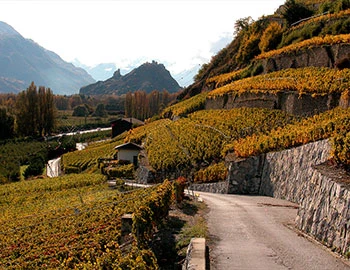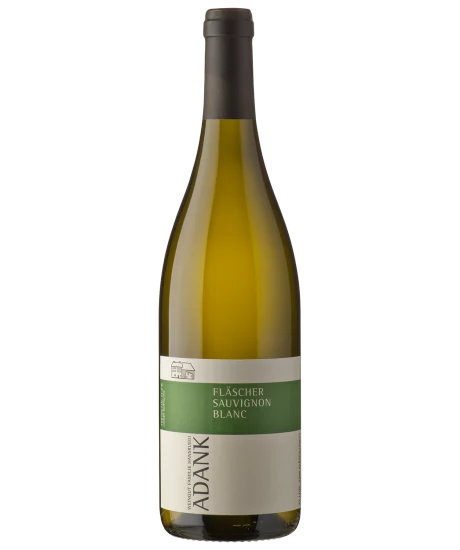Sauvignon Blanc 2023
AOC Graubünden, Hansruedi Adank, 750 ml

Description
In this Grisons Sauvignon Blanc, the styles of a Loire Valley and modern New Zealand Sauvignon Blanc are combined. In Fläsch, a complex, structured and delicate representative of this varietal is produced on Grisons slate with a deep limestone subsoil. In the complex nose it presents itself grassy-herbal, complemented by aromas of green pepper, lime and elderflower. On the palate an exciting aromatic duel is revealed: yellow exotic fruits and fresh, cool herbs with a hint of barrique influence. Very elegant and expressive.
Attributes
| Grape variety: | Sauvignon Blanc |
| Producer: | Hansruedi Adank |
| Origin: | Switzerland / Ostschweiz / Graubünden |
| Label: | Vegan |
| Ripening potential: | 1 to 5 years |
| Drinking temperature: | 10 to 14 °C |
| Food Pairing: | Asparagus specialities, Vegetable dip, Calamari alla romana, Goat's cheese, Scaloppine di vitello al limone |
| Vinification: | fermentation in steel tank, long must fermentation, fermentation at low temperatures |
| Harvest: | hand-picking |
| Maturation: | in cement egg, in used barriques |
| Bottling: | filtration |
| Maturation duration: | 7 months |
| Volume: | 13.0 % |
| Note: | Contains sulphites |
Sauvignon Blanc
The Sauvignon blanc can be recognized with your eyes closed. Its typical bouquet is marked by green notes: freshly cut grass, tomato bunches, gooseberry. Citrus fruits, cassis and flint join into the mix. In warmer latitudes it also shows exotic aromas, such as passion fruit. Its acidity is decidedly lively. In all likelihood, it comes from the Loire Valley, where it is vinified in Pouilly-Fumé and Sancerre in its purest form: varietally, and without timber. In the 18th century, it found its way to Bordeaux. Ambitious producers assemble it there with Sémillon into substantial whites, which are aged in oak barrels. The Sauvignon blanc has been a sensational success in the past 20 years in New Zealand. With its refreshing sweet-and-sour style, winemakers from down under have conquered the world. The rich Sauvignons from Styria and crisp examples of South Tyrol and Friuli are worth mentioning as well. It pairs with anything from the sea. Or do it like they do on the Loire, and enjoy it with goat cheese.
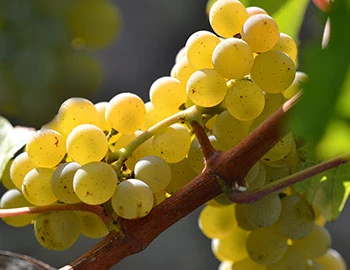
Graubünden
Graubünden: Mecca for Burgundy varieties
Nowhere in Switzerland has a better ratio of first-class Pinot noir crops to cultivation area than Graubünden. The ageing philosophy of vintners here leaves its imprint even more than the subtle differences in terroir from one vineyard village to the next. In recent years, three Pinot types have established themselves here: the light and sweet Herrschäftler for everyday drinking, the selections aged in large wooden barrels or used barriques, and of course the premium selections of individual estates matured in barriques.
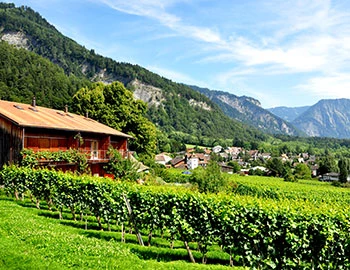
Ostschweiz
Eastern Switzerland: an intriguing puzzle
Eastern Switzerland has long been positioned on the northern rim of the climate zone where the cultivation of popular Swiss varieties is possible. Due to a warming climate, the vineyards of Aargau, Zurich, Schaffhausen, Thurgau and Graubünden are now in the zone where varieties such as Müller-Thurgau or Pinot Noir succeed excellently. But even long-established, almost-forgotten varieties such as Elbling, Räuschling and Completer are experiencing a renaissance.
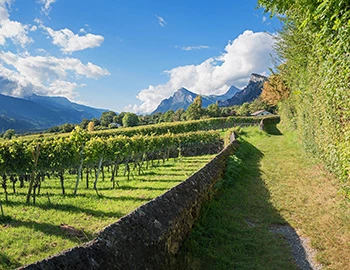
Switzerland
Switzerland – A small country with enormous diversity
Switzerland is famous for its banks, watches, and cheese, but not necessarily for its wine. The Swiss didn't invent wine, but they have been extremely open and curious to it. Wine culture arrived in what is now modern Switzerland via several routes: from Marseilles to Lake Geneva and the Lower Valais region; from the Aosta Valley through the Great St. Bernard Pass to the rest of Valais; from the Rhone through Burgundy, across the Jura Mountains to Lake Constance; and from Lombardy to Ticino, and then on to Grisons.
